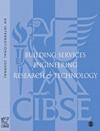Domestic heating with compact combination hybrids (gas boiler and heat pump): A simple English stock model of different heating system scenarios
IF 1.8
4区 工程技术
Q3 CONSTRUCTION & BUILDING TECHNOLOGY
Building Services Engineering Research & Technology
Pub Date : 2021-08-22
DOI:10.1177/01436244211040449
引用次数: 0
Abstract
The heat decarbonisation challenge remains substantial, competing low carbon solutions such as hydrogen and heat pumps (HPs) and the entrenched position of gas combination boilers create inertia in many markets. Hybrid appliances which can directly replace gas boilers may provide a low disruption, low-cost pathway to net zero in gas-reliant markets. Emerging compact combination (CoCo) hybrid heating appliances which combine a gas combi boiler and a small HP unit in one appliance have been modelled for the English housing stock across a range of different scenarios. CoCo hybrids offer sizeable energy demand reduction of up to 60% compared to current gas boilers, also reducing peak electrical demand by 10 GW compared to air source heat pumps. The control strategy for switching between HP and gas boiler is key in determining the scale of demand reduction. Modelling sensitivity to the HP size within CoCo hybrids showed that a 50% reduction in energy demand compared to gas boilers could be achieved with a standard 2.5 kW HP. A lack of clarity in regulation and policy incentives for hybrids exists. To drive innovation and performance improvement, product regulation for hybrids needs to be improved to support decarbonisation of heat with this promising technology. Practical Application Convenient, low disruption heat decarbonisation technology is crucial to the speed of deployment necessary to achieve net zero. This article defines the size of HP necessary to achieve rapid low disruption impact and distinguishes the types of compact hybrid which can deliver the highest decarbonisation impact while minimising in house disruption and the electrical grid impact.家庭供暖与紧凑的组合混合(燃气锅炉和热泵):一个简单的英文股票模型不同的供暖系统方案
热量脱碳的挑战仍然很大,氢和热泵(HP)等竞争性低碳解决方案以及燃气组合锅炉的根深蒂固的地位在许多市场造成了惯性。可以直接取代燃气锅炉的混合电器可能会为依赖天然气的市场提供一条低中断、低成本的净零排放途径。新兴的紧凑型组合(CoCo)混合供暖设备将燃气组合锅炉和小型HP机组组合在一个设备中,已在一系列不同的场景中为英国住房存量建模。与目前的燃气锅炉相比,CoCo混合动力车的能源需求大幅减少了60%,与空气源热泵相比,峰值电力需求也减少了10吉瓦。在高压和燃气锅炉之间切换的控制策略是决定需求减少规模的关键。CoCo混合动力车对HP大小的建模敏感性表明,与燃气锅炉相比,标准2.5 kW HP可以实现50%的能源需求减少。混合动力车的监管和政策激励措施缺乏明确性。为了推动创新和性能改进,需要改进混合动力车的产品监管,以支持这项有前景的技术实现热量脱碳。实际应用方便、低中断的热脱碳技术对于实现净零排放所需的部署速度至关重要。本文定义了实现快速低中断影响所需的HP规模,并区分了可以提供最高脱碳影响,同时最大限度地减少内部中断和电网影响的紧凑型混合动力车的类型。
本文章由计算机程序翻译,如有差异,请以英文原文为准。
求助全文
约1分钟内获得全文
求助全文
来源期刊

Building Services Engineering Research & Technology
工程技术-结构与建筑技术
CiteScore
4.30
自引率
5.90%
发文量
38
审稿时长
>12 weeks
期刊介绍:
Building Services Engineering Research & Technology is one of the foremost, international peer reviewed journals that publishes the highest quality original research relevant to today’s Built Environment. Published in conjunction with CIBSE, this impressive journal reports on the latest research providing you with an invaluable guide to recent developments in the field.
 求助内容:
求助内容: 应助结果提醒方式:
应助结果提醒方式:


